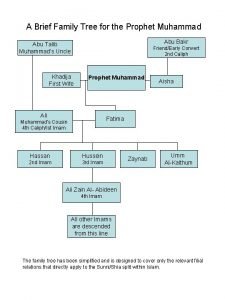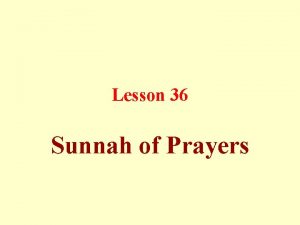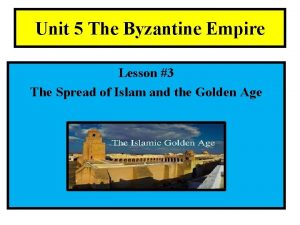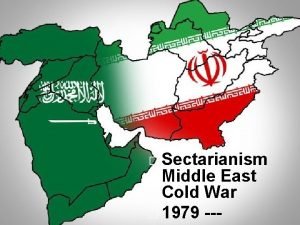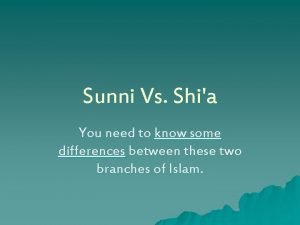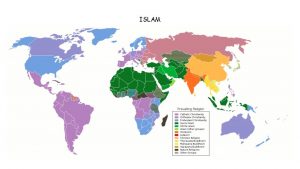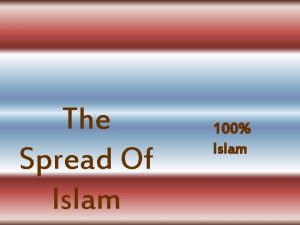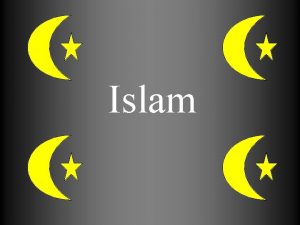Shia Islam Shia Islam the Imamate Muhammad raises















































- Slides: 47

Shi’a Islam


Shi’a Islam: the Imamate Muhammad raises the hand of Ali at Ghadir Khumm

Prophet Muhammad’s Family Tree (Ahl al-Bayt: the Family of the House) Abdul Mutalib (M’s Grandfather) Abu Tallib Abdullah (M’s Uncle) = (M’s Father) Amina (M’s mother) Abu Bakr (M’s closest companion) Khadijah (M’s first wife) = Muhammad = Aisha (one of M’s later wives) Ali (M’s cousin and son-in-law) = (First Imam) Hassan (M’s grandson) (Second Imam) = Shi’a beliefs Fatima (M’s daughter) Hussain (M’s grandson) (Third Imam)

Prophet Muhammad’s Family Tree (Ahl al-Bayt: the Family of the House) = Abu Bakr (M’s closest companion) = Ali (M’s cousin and son-in-law) (First Imam) = Shi’a beliefs = Muhammad =

Prophet Muhammad’s Family Tree (Ahl al-Bayt: the Family of the House) Abdul Mutalib (M’s Grandfather) Abu Tallib (M’s Uncle) Abdullah (M’s Father) Amina (M’s mother) Khadijah (M’s wife) Ali (M’s cousin and son-in-law) (First Imam) Muhammad Fatima (M’s daughter) Hassan (M’s grandson) (Second Imam) Hussain (M’s grandson) (Third Imam) Abu Bakr (M’s closest companion) Aisha (one of M’s later wives)

What does the word ‘Shia’ mean? Shia: literal meaning is ‘supporter of’, ‘party of’ “Abraham was among his (Noah’s) shia” (Qur’an 37: 83) “He (Moses) found two men fighting, one being his shia, the other his enemy” (Qur’an 28: 15) Today, a shia is short for ‘Shia-tu-Ali’ ie the supporter of Ali; those who support the view that Ali and his progeny are the successors to the Prophet Muhammad

Shi’a beliefs Ahl al-Bayt Muhammad's family and descendants are known as Ahl al-Bayt (literally: ‘People of the House’) These are the names of all 12 Imams (descendants of Imam Ali) written in the form of Arabic name ﻋﻠﻰ 'Ali'


Zameer Hussain video: Crash course in Shi’a Islam https: //sites. google. com/site/londonrehub/video-2016

Sunni Islam o Movement can be identified in differences with the Shi'a o Dominating continuously since 661 CE o Sunni Islam claims to be continuation of revelations passed to Muhammad o Believe Caliphs did not have to be from the Prophet’s family o Believe Prophet did not designate a successor and his sunnah were based on mandated elections, which they wanted to abide to o Believe that any good Muslim can be a leader o Leaders come from agreements of consensus and do not recognize special sacred wisdom in their leaders o Believe that ‘Ali is not a “divine light” from the Prophet o Importance of Sunnah (meaning “customs” included in Hadiths) o Shari’ah: Islamic law was established

Shi’a § Believe in Muhammad’s teachings and religious guidance of his family, which is referred to Ahl al-Bayt § Bloodline continues through daughter, Fatima, and Son-in-law/cousin, ‘Ali § Believe descendants are Imams fathered by Ali § First three rulings of Sunni Caliphs is seen as an occurrence in history and not something that is connected to faith § Muhammad directed Ali as successor on many occasions; he is the rightful leader of Muslim faith § Ali is seen as a divinely appointed imam § Ali has power to add to Hadith and continue newly found beliefs of Islam § Shi'a believe in holy books after the Quran, including the Mushaf Fatima (Book of Fatima), Al-Jamia, and Al-Jafr (The Parchment) § Branches in Shi'a: Twelvers: Twelve rightful Imams and Alawites: believe ‘Ali is the incarnation of God

Shi’a teachings: Prophets and Imams God chooses certain human beings and purifies them to become the recipients and conduits of knowledge and guidance for the sake of others Those people who receive the ultimate degree of this light are the Prophets and their co-workers the Imams Their purification is such that they are without any kind of sin from birth onwards The intensity of their knowledge shows them the consequences of sin and thus they do not sin throughout their lives They are sinless (impeccable) and also free from error (infallible); the technical Arabic term used is ma'sum They are thus free from any doubt or weakness, and empowered and purified by God to become guides to the rest of humankind

Shi’a teachings on Prophethood and Imamate God showed through the Qur'an and Muhammad’s own words and actions that his successors should come from the Ahl al-Bayt The term Ahl al-Bayt literally means the household or family of Muhammad and technically refers to a group of his blood descendants through his daughter Fatima and her husband, Ali, who was also the cousin of Muhammad (they shared a common grandfather) God chose and blessed the Ahl al-Bayt and their descendants for spiritual leadership of the Muslim community, the Imamate, just as earlier God had chosen Abraham and his family to bring forth a line of Prophets Ali was appointed by God to be the first in the line of successors to Muhammad, the line of Imams. According to the majority school amongst the Shi'a, there were twelve Imams in this line They speak of “the fourteen sinless ones” (ma'sum) referring to Muhammad, Fatima and the twelve Imams. They were to guide humankind after Muhammad through the light that they possessed It would be fundamentally unjust of God to leave human beings without a guide; therefore the line of Imams will continue until the end of the world

What’s the difference between a Prophet and an Imam? The Imam is someone who, in the absence of the Prophet Muhammad, acts as a leader of the Muslim community. His role includes religious and secular affairs, and while he is not a prophet, the Imam is responsible for protecting the message and teachings of the Prophet. Unlike prophets, Imams do not receive revelation, but they do receive divine inspiration. Like prophets, Imams are sinless, free from error, and able to interpret the scripture of the prophet that they follow. This is based on the God-given gift of knowledge, which is open to them alone. Hence we can say that Prophet Muhammad brought the final revelation and the Imams protect its interpretation.

The six articles of faith in Sunni Islam

The Five Roots of Religion in Usul ad-Din in Shi’a Islam Usul ad-Din, the five roots of religion, can also be referred to as the ‘foundation of faith’. 1 The Oneness of God (Tawid) There is one God who has no equals; he is a Divine unity. He cannot be compared to anyone or anything. He is perfect and unique and He possesses infinite power and knowledge. 2 The Justice of God (Adalah) Allah is perfect justice, fairness and wisdom. He does not wrong anyone and he will not tolerate wrongdoing. 3 Prophethood (Nubuwwah) God has appointed 124, 000 prophets and messengers to guide human beings, showing them how to live in peace and submission to God. 4 Leadership (Imamate) Shi’as believe that, after the Prophet’s death, God appointed twelve infallible Imams to guide the Muslim community. Shi’as call this Ahl al-Bayt (the People of the House). 5 Resurrection (Qayamat) The belief that, on the Day of Judgement, there will be a Resurrection, when all human beings will be physically raised to life to be judged by God.

Shi’a Islam: The Five Roots of Religion Task: label each of these headings, giving a sentence to explain each one

Comparing beliefs: Sunni and Shi’a Islam Sunni Islam: the SIX articles of Faith Shi’a Islam: the FIVE roots of religion Belief in: 1. Allah: God 2. Risallah: Prophethood 3. Qur’an: Holy Books 4. Malaikah: Angels 5. Akhirah: The Day of Judgement 6. Al-Qadr: God’s Divine Will Belief in: 1. Tawid: the Oneness of God 2. Adalah: the Justice of God 3. Nubuwwah: Prophethood 4. Imamate: Leadership 5. Qayamat: Resurrection

1 The Oneness of God (Tawid) There is one God who has no equals; he is a Divine unity. He cannot be compared to anyone or anything. He is perfect and unique and He possesses infinite power and knowledge. He is immortal (he was never born) and has no partner or children. He alone should be worshipped. [Box] “He is Allah, the One and Only; Allah the eternal, Absolute” (Qur’an 112: 1 -2) 2 The Justice of God (Adl or Adalah) Adalah is the belief God is perfect justice, fairness and wisdom. He does not wrong anyone and he will not tolerate wrongdoing. He cannot abuse His power by performing acts that go against His own nature to be just and fair. Humans must be responsible for their own actions, good or bad.

3 Prophethood (Nubuwwah) God has appointed prophets and messengers to guide human beings, showing them how to live in peace and submission to Him. According to some Islamic sources God has sent 124, 000 prophets; some of these brought divine scriptures with them from God. All Muslims believe that Muhammad was the seal of the prophets, meaning that he brought the final, perfect and unchanging message from Allah.

4 Leadership (Imamate) All Muslims believe that Muhammad was the last prophet, who brought the final scripture (the Qur’an) to humanity. Shi’as believe that, after his death, God appointed twelve infallible Imams to guide the Muslim community, leading them on the path set by the Prophet Muhammad. These Imams are part of what Shi’as call Ahl al-Bayt (the People of the House). In other words, they are part of Prophet Muhammad’s extended household. Of these twelve, eleven have been killed. They believe that the twelfth (or hidden) Imam is still alive, but is in hiding (occultation), waiting to reappear and rule on Earth with justice. They sometimes refer to him as the Mahdi. Muslims believes that God send around 124000

5 Resurrection (Qayamat) The belief that, on the Day of Judgement, there will be a Resurrection, when all human beings will be physically raised to life to be judged by God. He will reward the good and punish the evil. “Then shall anyone who has done an atom’s weight of good, see it! And anyone who has done an atom’s weight of evil, shall see it. ” (Qur’an 99: 7 -8)


Shi’a Islam: The Ten Obligatory Acts (Furu ad-Din) Five roots and ten branches of Shi’a belief For Shi’a Muslims, Islam is often pictured as a bountiful tree. The five roots of religion act as the source of strength for the Muslim life of faith. These are the central beliefs, with the trunk and branches growing up from these roots. There are 10 branches or obligatory acts which form the key features of religious life. The Ten Obligatory Acts (Furu ad-Din) The ten obligatory acts of Shi’a Islam are known as Furu ad-Din. They are: Salah, Sawm, Zakah, Khums, Hajj, Jihad, Amr-bil-Maroof, Nahil Anril Munkar, Tawalia, Tabarra. An obligation is a duty. The obligatory acts are practices that Muslims believe God has made compulsory

Shi’a Islam: The Ten Obligatory Acts (Furu ad-Din) (1) 1 Salah (prayer) Many Shi’as pray 3 x daily. They believe Muhammad allowed the combination of prayers: Zuhr with Asr and Maghrib with Isha. 1. between dawn and sunrise 2. just after noon 3. at dusk, just after sunset 2 Sawm (fasting) Like Sunnis, Shi’as fast during Ramadan, but from 20 th day of Ramadan they remember the death of Ali (son-in-law of the Prophet) spending 3 days in mourning 3 Hajj (pilgrimage) Shi’as go on annual Hajj to Makkah. They also make pilgrimages to Shi’a shrines and graves, in particular visiting the grave of Husayn in Karbala (in modern-day Iraq)

Shi’a Islam: The Ten Obligatory Acts (Furu ad-Din) (2) 4 Zakah (charity) Shi’as make a charity (zakah) payment of 2. 5% of their wealth every year. This goes to support the poor and those in need. 5 Khums (wealth tax) In addition to zakat, Shi’as are expected to pay khums, a wealth tax of 20% of their savings. This money is paid to Muslim scholars and community leaders for the welfare of the community. “Know that whatever of a thing you acquire, a fifth of it is for Allah, for the Messenger, for the near relative, and the orphans, the needy, and the wayfarer. ” Qur’an 8: 41 6 Jihad (struggle) Jihad is the duty to struggle against sin. For the sake of God, Muslims should fight against injustice, removing any obstacles that might prevent people being able to worship God

Shi’a Islam: The Ten Obligatory Acts (Furu ad-Din) (3) 7 Amr-bil-Maroof (encouraging others to do good) It is the duty of all Muslims to encourage others to do good, for the sake of Allah. In the Hadith Muhammad promises that the person who persuades someone else to do a good deed will get the same reward as the person he persuaded. “Let there arise out of you a group inviting all that is good, enjoining what is right and forbidding what is wrong. They are the ones to attain success. ” Quran 3: 104 8 Nahil Anril Munkar (discouraging the bad) It is the duty of all Muslims to forbid evil. The whole Muslim community (Ummah) has the responsibility to discourage others from harmful actions, such as bribery, corruption and dishonesty. “Whoever among you sees an evil should change it with his hand. If he is unable to to do that then with his tongue. If he is unable to do that, then with his heart, and this is the weakest level of faith” Hadith

Shi’a Islam: The Ten Obligatory Acts (Furu ad-Din) (4) 9 Tawalia (to love the friends of Allah) Tawalia means having love for God and for the Prophet Muhammad. Muslims should love all those who are friends of Allah: people who are truthful and kind, honest and fair. They should try to associate themselves with people who are kind and trustworthy. For Shi’a Muslims it also means having love for the ‘Ahl al-Bayt’, the 12 infallible Imams who are the descendants of Prophet Muhammad. 10 Tabarra (to hate the evil-doers) Muslims believe that it is important to dissociate themselves from the enemies of Allah. They should hate, and separate themselves from, people who are impure and those who oppress others. However, Muslims often disagree on exactly who are the enemies of God.

Ashura: Day of Sorrow and Inspiration Ashura is an important festival for all Muslims, but it has enormous significance in Shi’a Islam. It is celebrated (or commemorated) on the tenth day of Muharram Ashura literally means ‘tenth’, since it falls on the 10 th day of the month of Muharram is the first month of the Islamic calendar Sunni Islam: Day of fasting Many Muslims today fast on the day of Ashura. The Prophet Muhammad established Ashura as a day of fasting, based on the Jewish day of atonement, when sacrifices are made for the sins of the people. Ashura is an occasion to thank God for saving the Israelites from the Pharaoh. Sunni Muslims remember how Musa (Moses) fasted in gratitude to God for opening up the Red Sea to allow his people to escape from the Egyptian chariots.

Shi’a Islam: The martyrdom of Husayn Ashura is of particular importance to the Shi’a Muslim community, because it remembers the death of Hussain in battle at Karbala in 680 CE. This event triggered a split between Sunni and Shi’a Muslims that continues to divide Islam today. Shi’as believe that Hussain was the rightful successor to the Prophet Muhammad, so the massacre of Hussain and his followers carries great significance. They refer to Hussain as the third Imam, following his father Ali and his older brother Hassan. Still today they remember his betrayal and death with a deep sense of injustice.

Shi’a Muslims Celebrating Ashura: Shi’as mourning the martyrdom of Husayn http: //www. demotix. com/news/1628582/turkeys-shiite-muslims-mark-ashura-halkal#media-1628222 http: //www. telegraph. co. uk/news/picturegalleries/worldnews/8209691/Shiite-Muslims-flagellate-themselves-tocommemorate-Ashura. html? image=6 https: //www. youtube. com/watch? v=La. Wtr 10 b 1 es 32

How is Ashura celebrated around the world? The death Hussain gave rise to the Shi’a cult of martyrdom and to a sense of betrayal and struggle against injustice and oppression. Ashura is a day of great sorrow, mourning and self-mutilation, where much public grief is expressed. Central to the events is the need to share in the sufferings of Hussain. Ashura is celebrated in communities across the Shi’a world (eg in Iran and Iraq), but many Shi’a Muslims feel the need to make the pilgrimage to Karbala every year to take part: • men and women dress in black and march through street slapping their chests and chanting • there are processions and religious gatherings • plays re-enact the martyrdom • fervent men beat themselves with chains and cut their heads with swords

Shi’a Festival: Ashura (Day of Sorrow and Inspiration) Sunni Islam: Day of fasting The Prophet Muhammad established Ashura as a day of fasting, based on the Jewish day of atonement. Musa (Moses) fasted in thanks to God for saving the Israelites from Pharaoh. Shi’a Islam: The martyrdom of Hussain Shi’a Muslim community remember the death of Hussain in battle at Karbala in 680 CE. This event triggered a split between Sunni and Shi’a Muslims Shi’as believe that Hussain was the rightful successor to the Prophet Muhammad, so the massacre of Hussain and his followers carries great significance. They remember his betrayal and death with a deep sense of injustice.

Ashura literally means ‘tenth’, since it falls on the 10 th day of the month of Muharram is the first month of the Islamic calendar. Shi’a celebration of Ashura today Emotionally charged day, remembering the martyrdom of Hussain Celebrated with processions, plays and public displays of grief in the streets. Blood is often spilled and people cry and wail. • men and women dress in black and march through street slapping their chests and chanting • there are processions and religious gatherings • plays re-enact the martyrdom • fervent men beat themselves with chains and cut their heads with swords In cities such as Manchester and London Shi’as gather in large crowds and take part in public marches. The men often slap their chests violently, in time to their chanting, but it is uncommon to see them drawing blood

Shi’a celebration of Id-ul-Ghadeer (Iranian celebration) The festival of Id-ul-Ghadeer commemorates the pivotal event at Ghadeer Khumm when, by divine command, Prophet Muhammad designated his cousin Ali as the first in the continuing line of hereditary Imams. This event remembers how the Holy Prophet, on his return journey from the final pilgrimage, stopped at an oasis between Makkah and Madinah, known as Ghadir Khumm, and addressed the large gathering of Muslims instructing them to follow Ali. Every year they renew their allegiance to Prophet Muhammad and to Ali They carry green flags Two men with veils, representing Muhammad and Ali, hold up their hands together in the air.

Shi’a celebration of Id-ul-Ghadeer Tasks: 1 Who are these images meant to represent? 2 Explain what this image is saying for Shi’a Muslims 3 How might Sunni Muslims respond to this image? Why?

Key similarities and differences between Sunni and Shi’a beliefs and practices Sunni Shi’a Qur’an The Qur’an is an earthly copy The Qur’an is not eternal, but was created by God as a guide for human of a heavenly original. They beings. Everything in it has a hidden meaning to be interpreted by special usually interpret the Qur’an religious leaders (Imams) literally, as it is read. Shahadah (statement of belief) “I bear witness that there is no god but God, and Muhammad is the Prophet of God” Salah (prayer) Five prayer times every day Zakah (giving) Shi’as say the same Shahadah as Sunnis, but they add the phrase: “and I bear witness that Ali was the friend of God” Often pray three times a day Often pay zakah to the State Pay zakat to religious leaders and also pay an additional khums tax (government) Sawm (fasting) Fasting during Ramadan Shi’as fast the same way, but they also spend three days during Ramadan mourning the death of Ali Hajj (pilgrimage) Pilgrimage to Makkah Shi’as are expected to go on Hajj, but they also go on pilgrimage to other sites sacred to the Shi’a tradition (eg Karbala) Prophethood Risalah: Sunnis believe that Muhammad was the final prophet. Nubuwwah: Like Sunnis, Shi’as believe that Muhammad was the last prophet, but they also believe that there have been 12 infallible Imams since Muhammad’s death.

Sunni Shi’a The appearance of The Mahdi is the “guided one” who will come Shi’as too are awaiting the Mahdi, who will come on the Mahdi on the Day of Judgement with Isa (Jesus), to rid the Last Day, but they believe his identity will be the world of evil. revealed as the Hidden (or 12 th) Imam. Festivals Id-ul-Adha and Id-ul-Fitr In addition, Shi’as celebrate Ashura Al Qadr (predestination) God has set out a plan or destiny for all things. Many reject predestination, saying that God cannot be responsible for evil. Humans have free will. Required lineage for ruler Can be any practising Muslim chosen by the ummah Must be male child from lineage of Ali and Fatimah Imam (leadership) An imam is a leader chosen by the community. He is an ordinary man with strong faith in Qur’an and Sunnah An Imam is a holy figure, a divine guide, the only legitimate interpreters of the Qur’an, the political and spiritual successors of Prophet Muhammad. View on the personality of Imam Ali Considered as a 'Lion of God', the first male Prophet said: “Exemption from the Hellfire comes with convert to Islam, and a warrior champion of the love for Ali (A. S). ”; “Of whomever I was master, Ali (A. S) faith. is his master. ” Continuation of authoritative revelation No, authoritative revelation ended with Prophet Muhammad Partially true. Imams are considered divinely guided. The purpose is the explain and safeguard the current faith and its esoteric meaning. Angels God created angels from light. They do not have their own free will and always obey the commandments of God Angels obey God’s commandments. They have limited free will, though no drive to sin.

Sunni Vs. Shi'a

Sunni Vs. Shi'a Chart from: http: //www. religionfacts. com/islam/comparison_charts/islamic_sects. htm

Ali is proclaimed the successor to Muhammad About three months before his death, Muhammad led the Muslim community on the only Hajj that he performed. By this time, almost all the Qur'an had been revealed and the Muslim practice of the community was well established. All the practices and teachings of the Qur'an and the Prophet had been conveyed to the community. On the way back from this pilgrimage, on the journey from Makkah to Madinah, the Angel Gabriel (Jibril) appeared to Muhammad with the command to “convey what has been conveyed to you or else you have done nothing” [Q. 5: 67]. What could this definitive command be at this late stage of Muhammad’s mission, when the message had been so comprehensively conveyed? Muhammad halted the community at an oasis called Ghadir Khumm. This was the point at which the roads separated and some had already gone on their way; Muhammad called them back. The whole pilgrim body was thus assembled, by tradition some 72, 000 Muslims. Muhammad mounted a rock so that he could be seen and heard. He raised the hand of Ali and said that all those who accepted him, Muhammad, as their master or leader (maula) should take Ali as their maula after his death.

The Islamic community (Ummah, the worldwide islamic community) The Ummah is the worldwide community of Muslims. Sunni and Shi’a: who are they? One of the major divisions within Islam is the split between Sunni and Shi’a. Sunnis form the majority of Muslims in the world today (between 87 -90%); they live in the countries of North Africa, the middle east, south asia and Indonesia. The remaining 10 -13% of Muslims today are from the Shi’a community (although only about 5% of British Muslims are Shi’as). Shi’as live mainly in Iran, Iraq, Lebanon and India. Sunnis and Shi’as have coexisted for centuries, living peaceably side by side, often worshipping together in the same mosques, sometimes inter-marrying. Although they share most central beliefs they do have significant differences in the way they understand religious truth, laws and practices.

The Sunni and Shi’a split Soon after the death of Prophet Muhammad a dispute arose over who should lead the emerging Muslim community. Abu Bakr had been a close companion of the prophet and a large group of believers chose him to become the new caliph (leader). After Abu Bakr’s death Umar became the leader, then Uthman and then Ali. These four leaders have come to be known as the rightly guided caliphs and Sunni Muslims accept that they were god’s appointed leaders. However, there was a smaller group who believed that Ali, the cousin and sonin-law of Muhammad, should have become the first caliph. It was their belief that the prophet Muhammad had chosen and appointed ali as his successor and they rejected the leadership of Abu Bakr, Umar and Uthman. They were angry that Ali had been overlooked and when Ali was later murdered they began to separate themselves, calling themselves the Shi’a (the House of Ali). They believe that the prophet Muhammad appointed twelve successors (imams) from his own descendants, who are known as the Ahl al-Bayt, ‘the family of the house’ of Muhammad.

Sunni means ‘one who follows the Sunnah’ Shi’a means ‘from the party of Ali’. (Ali was a close relative to Muhammad). Following Prophet Muhammad’s death in 632 CE, the Muslim community needed to decide how to choose a new leader. Shi’as said that his successor could only come from his bloodline (ie his close family), while Sunnis looked to those men that the Prophet Muhammad had most trusted while he was alive. Sunnis believe that Religious guidance can only come from Allah through the Qur’an and the hadith. Together these holy books form the Shari’ah, Islamic law. There should be no religious hierarchy. Imams are not holy figures appointed by god. They are simply good teachers and leaders and should be chosen through agreement amongst the local community.

Shi’as believe that Allah guided the Prophet Muhammad to appoint Ali as his successor The leadership of the Muslim community has continued through ‘imams’ who are divinely appointed from descendants in Muhammad’s family The last imam will appear at the end of the world as the Mahdi (the chosen one who will bring justice to the world)

Sunni and Shi’a communities in the UK Most Muslims living in Britain today are Sunnis, but there are many shi’as here too. When Muslims began coming to Britain, in the 1960 s and 70 s, Sunnis and Shi’as often lived together as part of a single Islamic community, sharing mosques, praying and socialising together. However, as they have grown in numbers they have gained confidence to explore their own heritage these communities have begun to express their identities in different ways. This has often been fuelled by events in the middle east, where tensions between the Sunni and Shi’a communities has become more pronounced. Recently, wars and conflict in Iraq and Syria have added to the divisions amongst these groups.
 Prophet musa family tree
Prophet musa family tree Prophet muhammad family tree
Prophet muhammad family tree Horizontal in arabic
Horizontal in arabic Allahumma salli ala muhammad wa ala ali muhammad in english
Allahumma salli ala muhammad wa ala ali muhammad in english Attahiyat dua in english
Attahiyat dua in english Jesus raises the son of the widow of nain
Jesus raises the son of the widow of nain A rising tide raises all boats proverb
A rising tide raises all boats proverb Haloke does 176 j of work
Haloke does 176 j of work Melissa raises crickets
Melissa raises crickets Muhammad islam founder
Muhammad islam founder Chapter 6 the world of islam answer key
Chapter 6 the world of islam answer key Muhammad islam founder
Muhammad islam founder Muhammad islam founder
Muhammad islam founder Victor shia
Victor shia Shia attack on kaba 1979
Shia attack on kaba 1979 Shia oil
Shia oil Khoja shia ithna-asheri
Khoja shia ithna-asheri خاوا جاوا
خاوا جاوا Colre
Colre Khaled hosseini shia or sunni
Khaled hosseini shia or sunni Sectarianizing
Sectarianizing Sunni vs shia differences chart
Sunni vs shia differences chart Sunni vs shia differences chart
Sunni vs shia differences chart How to perform ghusl
How to perform ghusl Usul ad din 5 roots
Usul ad din 5 roots Shia 974
Shia 974 Cara memelihara agama
Cara memelihara agama Perkataan nirleka berasal daripada perkataan
Perkataan nirleka berasal daripada perkataan Faedah mengamalkan perundangan islam
Faedah mengamalkan perundangan islam Các châu lục và đại dương trên thế giới
Các châu lục và đại dương trên thế giới Một số thể thơ truyền thống
Một số thể thơ truyền thống Thế nào là hệ số cao nhất
Thế nào là hệ số cao nhất Frameset trong html5
Frameset trong html5 Sơ đồ cơ thể người
Sơ đồ cơ thể người Tư thế ngồi viết
Tư thế ngồi viết Số nguyên tố là số gì
Số nguyên tố là số gì đặc điểm cơ thể của người tối cổ
đặc điểm cơ thể của người tối cổ Cách giải mật thư tọa độ
Cách giải mật thư tọa độ Chụp phim tư thế worms-breton
Chụp phim tư thế worms-breton ưu thế lai là gì
ưu thế lai là gì Thẻ vin
Thẻ vin Cái miệng nó xinh thế
Cái miệng nó xinh thế Các châu lục và đại dương trên thế giới
Các châu lục và đại dương trên thế giới Bổ thể
Bổ thể Từ ngữ thể hiện lòng nhân hậu
Từ ngữ thể hiện lòng nhân hậu Diễn thế sinh thái là
Diễn thế sinh thái là Tư thế ngồi viết
Tư thế ngồi viết Ví dụ về giọng cùng tên
Ví dụ về giọng cùng tên

